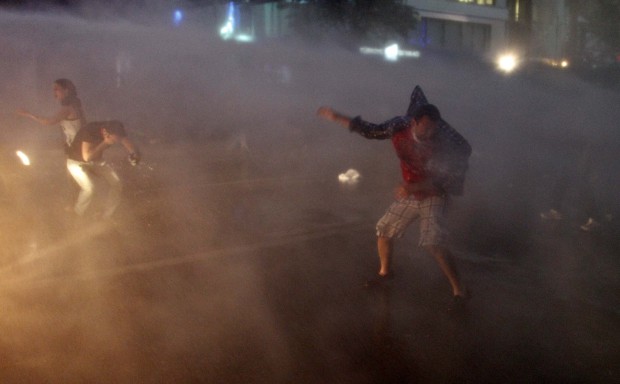
Anti-government protesters run to take cover to protect themselves from water cannons and tear gas as riot police disperse them during a protest in Ankara June 5, 2013. (Reuters/Umit Bektas)
Tunis/Istanbul, Reuters—Turkish Prime Minister Tayyip Erdogan condemned the “burn and destroy” tactics of some of those involved in days of violent protests on Thursday, and promised to press ahead with plans for an Istanbul park which triggered the unrest.
Speaking on a visit to Tunisia, Erdogan said “terror groups” were manipulating what had started as an environmental campaign, and added that seven foreigners were among those arrested.
“If you say:’I will hold a meeting and burn and destroy’, we will not allow that,” he told reporters after meeting his Tunisian counterpart. “We are against the majority dominating the minority and we cannot tolerate the opposite.”
By confining his comments to a group of protesters, Erdogan appeared softer in tone than before he left for North Africa at the start of the week, when he described the demonstrators in blanket terms as looters.
Nevertheless, his defiance rattled nervous financial markets. The main Istanbul stock index was down 4.7 percent by 1257 GMT while the lira weakened to 1.8923 against the dollar. The two-year benchmark bond yield rose to its highest in more than six months.
Erdogan returns to Turkey later on Thursday to face demands he apologize for a police crackdown on the six days of protests in which three people have been killed and more than 4,000 injured in a dozen cities, and to sack those who ordered it.
What began as a campaign against the redevelopment of a leafy Istanbul park has grown into an unprecedented show of defiance against the perceived authoritarianism of Erdogan and his Islamist-rooted AK Party.
Police backed by armored vehicles have clashed with the protesters night after night, while thousands have massed peacefully in recent days on Taksim Square, where the demonstrations first began.
A policeman who fell from a bridge in the southern city of Adana while chasing protestors died of his injuries, Turkish television stations reported, the third death in the protests.
AK Party Deputy Chairman Huseyin Celik called on members not to welcome Erdogan home at Istanbul airport to avoid stirring trouble. “The prime minister does not need a show of strength,” Celik said in a television interview.
In Taksim Square, protesters remained defiant. “We have the momentum, with people like me going to work every day and coming back to attend the protests,” said Cetin, a 29-year-old civil engineer who declined to give his surname because he works for a company close to the government.
“We should keep coming here to protest until we really feel we’ve achieved something,” he said, one of thousands gathered on Taksim Square until late into the night.
Deputy Prime Minister Bulent Arinc, formally in charge while Erdogan is away, has struck a conciliatory tone, apologizing for the initial police crackdown on peaceful campaigners in Taksim’s Gezi Park and meeting a delegation of protesters in his office in Ankara.
Around Ankara’s Kugulu Park, a middle class area dotted with restaurants and bars, people chanted “dictator resign” and “everywhere is Taksim, everywhere is resistance” late on Wednesday as residents banged pots and pans in support.
But the situation was calmer around the 19th-century Dolmabahce Palace in Istanbul, the caliph’s seat of power until the Ottoman empire collapsed in 1922 and now home to Erdogan’s offices, where some of the fiercest clashes have taken place.
Tourists picked their way along dirt paths where paving stones had been ripped up in the protests.
Despite the unrest, Erdogan remains by far Turkey’s most popular politician, his assertive style and common touch resonating with the conservative Islamic heartland.
His AK Party has won an increasing share of the vote in three successive elections and holds around two thirds of the seats in parliament. A man who rarely bows to any opposition, he clearly has no intention of stepping down and no obvious rivals inside or outside his party.
But he, and those around him, face a challenge in calming the protests without appearing to lose face.
On Wednesday, a small group of people who read a statement in support of the protests were set upon in the Black Sea city of Rize, Erdogan’s homeland and a stronghold of the AK Party, an attack that ended only after police intervened.
“Erdogan cannot backtrack now. It would mean defeat,” said Ali Aydin, 38, a car dealer in the Tophane neighborhood of Istanbul, a conservative bastion in the mostly Bohemian district around Taksim Square. “Weakness would destroy the party.”
